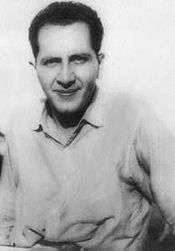Joaquín Pasos
| Joaquín Pasos | |
|---|---|
 | |
| Born |
May 14, 1914 Granada, Nicaragua |
| Died |
January 20, 1947 (aged 32) Managua, Nicaragua |
| Occupation | Poet, essayist, narrator |
| Nationality | Nicaraguan |
Joaquín Pasos (May 14, 1914—January 20, 1947) was a Nicaraguan poet, narrator, and essayist. He was one of the leading figures of the national Vanguardia literary movement. The poem Pasos is best known for was his Canto de guerra de las cosas (The song of the war of things) poem.[1]
Biography and early writing
Pasos was born in Granada, Nicaragua and studied at the Universidad Centroamericana. During his puberty and incipient adolescence, he was a literary prodigy. Pasos began to write relentlessly at the age of 14, opening in that way what should later become the first of his two creating phases. The first one of these creating phases would take place between 1928 and 1935.
In this stage he only showed a broad ability to apprehend and digest the style and patterns of some modern literary figures such as Paul Morand, Valery Larbaud, Philippe Soupault, J. J. Van Doren, Rafael Alberti & Gerardo Diego. We can also observe a certain obsession with geographic eccentricities (the poems “Norway”, “Cook Voyages”, “German dream No.5”) and a juvenile fetish for foreign actresses.
Later writing
After 1935–and until his death–his poetry obtains its own voice. In this phase Pasos reaches his maturity as a writer; the poet has hatched from the avant-garde egg & enters the world each writer secretly creates between his firstly written lines. With an exceptionally rich metaphor; with a lyrical self that pends between love and humor; Pasos began to write some of America’s most original love poems (“Immense poem”, “Invention of a new kiss”, “Construction of your body”, “Big poem about strong love”) and entered the waters of the indigenous side of Nicaraguans’ nicaraguancy (“The blind Indians”, “The old Indians”, “Two cries”, “Indian fallen in the market”).
After the writing of these poems, he wrote his masterpiece, “The song of the war of things”, that, in contrast to T. S. Eliot’s The Waste Land, covered in a much more global manner, the physical and metaphysical position of the man of the 20th century. This is the last stanza of the poem:
- All the sounds of the world form one great silence.
- All the men of the world form solely one ghost.
- Amidst this pain, soldier!, your position lies empty or full.
- The lives that remain have gaps,
- they have complete vacuums,
- as if mouthfuls of flesh would’ve been taken out of their bodies.
- Take a close look to this bite, this one I have on my chest,
- To see heavens and hells.
- Look at my head cracked with a million of holes:
- Through it shines a white sun, through it a black star.
- Touch my hand, this hand that yesterday held steel:
- You can pass in through the air; you can pass your fingers through :Here is the absence of man, escape of flesh, of fear, days, things, souls, fire.
- Everything remained in time. Everything was burned far away.
- The Song of the war of things -Joaquin Pasos
y tubo q
Career
“Joaquinillo”, like the other Nicaraguan poet Carlos Martínez Rivas called him, was commonly known in his country for his humoristic labor. Next to Joaquín Zavala, he created “Opera Bufa” a political, literary & humoristic magazine that denounced the Liberal and Conservative political parties. He also worked next to poet Manolo Cuadra, the humorist and poet Ge Erre Ene (Germán Rivas Novoa), the other humorist Alejandro Cuadra and the cartoonist Antonio López in “Los Lunes” a humoristic magazine that attacked the dictator Anastasio Somoza García.
Death
In almost full anonymity–at an international level–Pasos died in Managua, capital of Nicaragua, January 20, 1947.
References
- ↑ "Nicaragua; Literature". Nicaragua.com. Retrieved 2007-10-20.
...Pasos is best known for his magnificent poem “War Song of Things”.
External links
- The Nicaraguan Indian in Pasos' work
- An acknowledgment of his work
- A selection of his poetry translated to English
- A selection of his poetry in Spanish